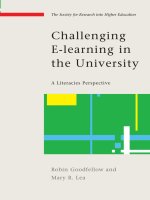open university press study skills for psychology students nov 2008
Bạn đang xem bản rút gọn của tài liệu. Xem và tải ngay bản đầy đủ của tài liệu tại đây (28.97 MB, 240 trang )
Study Skills for
Psychology
Students
Jennifer Latto ❙ Richard Latto
Ø
See Website
for careers advice
Series Editor:
David Canter
Successful Studying
Study Skills for Psychology Students
Study Skills for
Psychology
Students
Jennifer Latto and Richard Latto
Open University Press
McGraw-Hill Education
McGraw-Hill House
Shoppenhangers Road
Maidenhead
Berkshire
England
SL6 2QL
email:
world wide web: www.openup.co.uk
and Two Penn Plaza, New York, NY 10121-2289, USA
First published 2009
Copyright © Jennifer Latto and Richard Latto 2009
All rights reserved. Except for the quotation of short passages for the purposes
of criticism and review, no part of this publication may be reproduced, stored
in a retrieval system, or transmitted, in any form, or by any means, electronic,
mechanical, photocopying, recording or otherwise, without the prior written
permission of the publisher or a licence from the Copyright Licensing Agency
Limited. Details of such licences (for reprographic reproduction) may be obtained
from the Copyright Licensing Agency Ltd of Saffron House, 6–10 Kirby Street,
London, EC1N 8TS.
A catalogue record of this book is available from the British Library
ISBN 10: 0-335-22909-3 (pb) 0-335-22910-7 (hb)
ISBN 13: 978-0-335-22909-3 (pb) 978-0-335-22910-9 (hb)
Library of Congress Cataloging-in-Publication Data
CIP data applied for
Typeset by RefineCatch Limited, Bungay, Suffolk
Printed in the UK by Bell and Bain Ltd, Glasgow
Fictitious names of companies, products, people, characters and/or data that may
be used herein (in case studies or in examples) are not intended to represent any
real individual, company, product or event.
Cartoons drawn by Adam Paxman
For Georgina Brennan, Julia Henderson and Steve McArdle
Contents
Skills for Successful Study series xi
Series editor’s preface xiii
Introduction: why you need this handbook and how to use it 1
1 First things first 5
1.1 About psychology 5
1.2 How your university or college works 14
2 Organizing inputs 21
2.1 What kind of student are you? 21
2.2 Structuring information 28
2.3 Formal teaching 41
2.4 Learning in groups 49
2.5 Learning through experience 54
2.6 Personal development profiling 57
3 Using IT 63
3.1 Using learning resource centres 63
3.2 Using in-house electronic resources 69
3.3 Surfing the web and evaluating what you find 80
3.4 Saving information effectively 82
3.5 Plagiarism detection software 84
4 Achieving good outputs 91
4.1 The purposes of assessment 91
4.2 Writing essays 93
4.3 Writing practical reports 113
4.4 Giving presentations (or how to avoid death by PowerPoint) 114
4.5 Preparing and presenting posters 119
4.6 Contributing to seminars 120
4.7 Taking examinations 121
4.8 Overall thoughts on assessment 131
5 Research projects and dissertations 133
5.1 Planning your timetable 133
5.2 Choosing a topic 135
5.3 Making the most of your supervisor 137
5.4 Designing the project 139
5.5 Getting ethical approval 143
5.6 Running the project 145
5.7 Reporting and analysing your results 146
5.8 Common errors of interpretation 156
5.9 Writing up 161
6 What next? 163
6.1 Introduction 163
6.2 Ideas about careers in general 166
6.3 Regulation 169
6.4 Careers in psychology 170
6.5 Postgraduate courses 172
6.6 Working and training abroad 174
6.7 Other careers 175
6.8 Longer term 176
Appendices
1 How to reference your work 177
2 Answers to exercises 184
3 Acronyms and abbreviations 186
4 Glossary 188
5 Common terms (and some of their alternatives) used in
statistics 201
viii CONTENTS
6 Further reading 211
References 214
Index 217
CONTENTS ix
Skills for Successful Study series
Skills for Successful Study is an exciting new discipline-orientated study skills series
that will benefit students by drawing on examples that will speak directly to
them about the challenges and successes within their own study environments.
Each book will support the student throughout their course: from the trepidation
of beginning to study, through to becoming an expert learner, and onward to
planning a career.
A free careers website is also available, at www.openup.co.uk/psychology
success
Other titles in the series
Scullion and Guest, Study Skills for Nursing and Midwifery Students
More new titles coming soon!
Series editor’s preface
Study Skills cover all those abilities that make it possible to cope with the demands
of academic and professional pursuits. For people just embarking on a course of
study they include being able to deal with all the intellectual, emotional and
social challenges that are part of the day-to-day demands of being a student.
Beyond the skills involved in coping are those that enable students to do well in
their chosen disciplines. These embrace much more than the ability to memorize
or understand the topics of study, reaching into time management, ethics and
the personal and interpersonal upheavals that are often such an important part of
the student’s life.
The study skills that are mastered at university, or for some people earlier when
studying at school, are central to what everyone has to offer as a graduate and/or
professional. Some people would even suggest that the main contribution of a
university degree is to provide a person with the skills for studying. It is these
skills that will help the person through the rest of their career.
Studying is a skill that can be mastered like many others, by first understanding
the process then by developing appropriate habits through active involvement.
Yet whilst there are some aspects of the process that are common to all forms
of study there are often important facets of any particular area of study that
demand special skills. Further, even when the skills may be relevant across a
number of different disciplines it is usually easier to understand what is required
by embedding consideration of them within the specific topic.
This series of books is therefore being published with guidance on how to be an
effective student within each of a series of specific domains. By dealing with study
skills in relation to the area of study it is possible to ensure that the examples are
directly pertinent to the student of that area, rather than being general exhort-
ations. The books thus complement the many other publications available on
such general topics as essay writing or taking examinations.
The focus on particular areas of study also enables the authors to follow the
particular educational trajectory from the early entry into college or university
right through to becoming a recognised professional in the chosen discipline. It
allows the authors to draw on examples that speak directly to students about
issues in their own lives. It also enables the books to identify particular topics that
are of special significance for any given discipline.
This series therefore provides a valuable resource to all students that they can
draw on as a friend and guide throughout their course of study and beyond.
David Canter
Series Editor
University of Liverpool
xiv SERIES EDITOR’S PREFACE
Introduction: why you
need this handbook
and how to use it
Psychology is a multi-disciplinary subject which studies the most intrinsically
interesting and important topic of all: human behaviour. This is both its great
strength and its great challenge. The evidence on which it draws ranges from the
qualitative and descriptive approaches of some of the social sciences to the
laboratory based and highly technical. As a student, you will have to come to
terms with this fascinating but often challenging spectrum of methodologies
and techniques. It is a stimulating, sometimes daunting, but always rewarding
task, which will leave you with a wide range of knowledge and skills offered by no
other degree.
Over the years, many psychology graduates have confided to us, having walked
across the stage to receive their degrees, that it was only since they had really got
down to work for their final exams that they had realized what a fascinating
subject psychology is, and how many applications it has in everyday life. The
object of this book is to bring this revelation forward so that you can make
the most of our insights and advice, both to enjoy studying for your degree and to
achieve more successful outcomes.
Psychology is one of the most popular undergraduate degree choices and is
taught in a wide variety of universities and colleges. This handbook provides an
introduction, guide and reference book for you to use at all stages in your study of
psychology.
In Chapter 1, we begin by giving you a brief introduction to psychology and
psychological thought, which has fascinated and intrigued us both throughout
our careers. We then give you a brief starter guide to the conventions and struc-
tures of higher education. Chapter 1 also provides an indication of the resources
likely to be available to you at your university or college, and how to use them to
best effect to make a success of your time there. In the end, what you learn is up
to you. We aim to give you a toolkit for tackling both the knowledge and skills
which make up the components of a degree in psychology that you can expect to
encounter, and references to further sources of information and advice.
In Chapter 2, we provide support for handling the many different kinds of
input you will receive during your degree; both from reading books, journals and
websites, and from formal teaching such as lectures, seminars and tutorials.
We discuss learning in groups, learning through experience in a whole range of
work situations, and how to make good use of personal development profiling.
We also offer advice on how to stay on top of your rapidly accumulating store of
knowledge.
Information technology plays a vital part in working for a psychology degree
and we therefore devote the whole of Chapter 3 to making the most of the help it
can provide.
During your course you will acquire a wide range of knowledge and useful
skills, and you will be required to demonstrate them in many different kinds
of assessment task. In Chapter 4 we give you our advice, based on many years of
teaching students in a variety of contexts, on how to cope with essays, practical
reports, presentations, posters, seminar contributions and, last but not least,
examinations.
Most psychology courses have an individual research-based dissertation or
project in the final year, which carries a considerable proportion of final degree
marks. We devote the whole of Chapter 5 to this task, which can seem rather
daunting, but, if it goes well, will form one of the most rewarding parts of the
course and give you the chance to explore something of particular interest to you
in considerable depth.
Chapter 6 considers eventual careers. The roles of the British Psychological
Society and Regulation of Practising Psychologists by the Health Professions
Council are discussed. Thoughts about postgraduate courses in psychology,
practising as an applied psychologist (in the UK or abroad) and getting your first
post, whether as a psychologist or not, are shared.
Detailed appendices provide important guides to referencing, psychological
acronyms, and glossaries of common psychological and statistical terms, which
you can refer to quickly while you are working. As you read through the book,
the first reference in each chapter to terms that are explained in the main
glossary (Appendix 4) is in bold. Look them up if you are not sure exactly what
they mean. (Appendix 4 also contains details of some of the main terms that,
while they are not mentioned in this book, are likely to crop up during your
psychology studies.)
2 STUDY SKILLS FOR PSYCHOLOGY STUDENTS
On the associated website (www.openup.co.uk/psychologysuccess), you will
find regularly updated information about careers in many different aspects of
psychology, with descriptions of what they entail and information about
training, with a whole range of useful ‘click on’ website addresses giving further
details to take you on to the next stage.
How to use this book
1 Read the book from cover to cover, ideally before you embark upon your
degree. It will give you a very good idea of what the experience of a psychology
degree is like, and the different challenges you will encounter.
2 As the various milestones come up: first days at university, first tutorial, first
experience of university teaching, first visit to the learning resources centre,
first attempts to get to grips with the IT system, first assessment, first thoughts
about a career, and then your project, you will find a relevant section to help
you through.
3 For advice on specific issues during the course, use it as a reference book by
consulting the contents page or the index. Each chapter is divided into care-
fully labelled sections to help you locate advice on specific matters.
4 Study how we have presented references, quotations, figures and tables. We
have used the American Psychological Association (APA) conventions
throughout as this is the most widely used system in psychology and you will
be using it, or something very similar, in your coursework. Try to become
familiar with these formats and use the book as a presentation guide for your
own work.
The book also includes:
• many diagrams and figures
• exercises for practising certain specific skills
• tips for quick reference help
• advice from our own students
• examiners’ thoughts
• cartoons for light relief
• TOMtips (see below).
TOMtips are a particular feature of the book. They are there to encourage you to
use your theory of mind (and here is an example of the convention throughout
the book that things in bold indicate that they are in the Glossary in Appendix 4).
INTRODUCTION 3
The importance of theory of mind (TOM) was nicely expressed at the start of
the twentieth century: “Success in life rests upon one small gift – the secret of
entry into another man’s mind to discover what is passing there” (Henry Seton
Merriman, 1901).
The subject of investigation by psychologists from a variety of theoretical per-
suasions, theory of mind is a powerful tool for flourishing in all those situations –
such as presentations, exams and interviews – where we are trying to impress
other people. Considering what your audience is thinking and feeling makes it
easier to achieve the outcomes you desire.
In conclusion
No book of this kind can guarantee success: only your own efforts can achieve
that, but by offering you the experience and advice gleaned from our students
and our own careers, we offer you a powerful launching pad for your efforts.
You are now starting on a new journey in psychology, and this book should
help you to both enjoy it and make a success of it. We hope the advice we offer
here will enable you to do well, but remember that the purpose is not simply to
get a degree but to enjoy learning about psychology and acquiring new skills.
As Henry Miller put it: “One’s destination is never a place but rather a new way of
looking at things” (1957, p. 25).
4 STUDY SKILLS FOR PSYCHOLOGY STUDENTS
1
First things first
1.1 About psychology
1.2 How your university or college works
This chapter will help orientate you to the discipline of psychology, and to find
your way around your university or college.
1.1 About psychology
What is psychology?
One important and useful thing to think about for starters: psychology is a fast-
evolving science and what you will be studying is only our current understanding
of human behaviour. The state of our knowledge progresses through observa-
tions, which give rise to theories, which lead to predictions. We then attempt to
test these predictions through experiments or further systematic observations,
which may confirm the predictions or lead us to revise the theory. This, in very
simple terms, is the scientific model (see Figure 1.1).
Experiments either confirm or contradict the theory, and lead us to modify it
to accommodate our new information, which leads to more experiments. The
position has been excellently summarized as ‘the Endless Search’ by Donald
Broadbent, who taught both of us.
We end then upon a note of doubt, with no certainty about the beliefs which
future psychologists will hold. This is as it should be. Nobody can grasp the
nature of things from an armchair, and until fresh experiments have been
performed we do not know what their results will be. The confident dogma-
tisms about human nature which fall so readily from pulpits, newspaper
editorials, and school prize-givings are not for us. Rather, we must be
prepared to live with an incomplete knowledge of behaviour but with
confidence in the power of objective methods to give us that knowledge
some day.
(Broadbent, 1961, p. 200)
Take dreaming, for example. Why do we dream? In the 1950s, Kleitman observed
that there are periods of rapid eye movements (REM) during sleep, and that
if the sleeper is woken during these episodes they are likely to report dreams
(Aserinsky & Kleitman, 1953). Freud (1991) thought that dreams were a product
of the brain working through the events and emotions of the previous day, and
trying to absorb and come to terms with them. A more pragmatic explanation
based on information processing theory sees dreams as analogous to clearing a
memory store by processing memories at an unconscious level, preparing us for
Figure 1.1. The scientific model.
6 STUDY SKILLS FOR PSYCHOLOGY STUDENTS
new experiences the following day. Paul McCartney picked up this idea in his
album entitled “Memory Almost Full” (McCartney, 2007). There is even some
evidence that sleep helps recently learnt material become consolidated into
memory (Maquet et al., 2000; Born, Rasch & Gais, 2006)
Waking people constantly during REM sleep causes them to become very
irritable and to function less efficiently. This could appear to reinforce either
theory (or indeed neither, as people woken constantly during the night are likely
to become very irritable) so further experiments are called for, and so the research
goes on.
Of course it gets more complicated than this. Different groups of psychologists
come at behaviour from their own theoretical standpoints, just like the people
trying to explore the reason for dreaming.
Different approaches to psychology
The idea of psychology as an evolving science can be illustrated, in very broad
terms, by summarizing some of the main approaches that have been adopted
during its historical development.
Behaviorism
The approach to psychology developed from Ivan Pavlov’s experiments in 1903
with dogs, which learned to salivate when they heard a bell that they had come to
associate with the appearance of food. Behaviorists (note the American spelling)
argue, and have demonstrated to some extent, that humans operate on a very
simple conditioning model, and that behaviour can be modified by rewarding or
punishing particular behaviours to increase or eliminate them. Behaviorism is
based on the idea that we can only meaningfully study externally visible
behaviour and that all else is valueless speculation. A person’s behaviour is inter-
preted in terms of their learning history, particularly the patterns of reward and
punishment they have experienced. It was developed by John B. Watson
(1878–1958), E. Thorndike (1874–1949), B.F. Skinner (1904–1990) and others in
America. Watson demonstrated empirical evidence for classical conditioning
in the case of a boy called Little Albert, whom he trained to be afraid of a white rat
by associating its appearance with an unpleasant stimulus. While no longer sup-
ported in its purist form, it has nevertheless proved a valuable tool in studying
animal behaviour in laboratory situations and describing human behaviour in
simple situations. This technique has been extensively exploited in advertising –
for example, where the repeated association of an arbitrary positive stimulus,
such as a beautiful woman, with an emotionally neutral object, such as a car,
results in the latter coming to elicit the warm feelings associated with the former.
FIRST THINGS FIRST 7
Biological
(Also known as physiological psychology.)
This approach concentrates on studying the activity of the nervous system,
especially the brain, the action of hormones and other chemicals, and genetics,
on the assumption that behaviour is largely shaped by biological processes. This
approach analyses how biology shapes mental processes and behaviour – for
example, how the brain controls movement, receives information from the
senses or processes language. It was developed by Karl Lashley (1890–1958), who
identified the role of the cortex in memory, James Olds (1922–1976), who dis-
covered the ‘reward systems’ in the brain, and Donald Hebb (1904–1985), who
studied the contribution of neurons to learning.
8 STUDY SKILLS FOR PSYCHOLOGY STUDENTS
Cognitive
Cognitive psychology studies how people absorb, mentally represent and store
information. It models internal mental processes such as perception, attention,
memory, language and problem solving, and had its foundations in Gestalt
psychology. Cognitive psychologists are interested in how people understand,
diagnose and solve problems, i.e. the mental processes that mediate between
stimulus and response. Wilhelm Wundt (1832–1920), who, together with
William James (1842–1910), is seen as the father of psychology, sought to
investigate the immediate experiences of consciousness (including feelings,
emotions, volitions and ideas) mainly explored through introspection (i.e. the
self-examination of conscious experience by objective observation of one’s con-
sciousness). Hermann von Helmholtz (1821–1920), another early psychologist
with a background in the experimental sciences, is known for his theories of
visual perception, colour vision, the sensation of tone and perception of sound.
These psychologists distinguished themselves from much earlier philosophers
like Renée Descartes (1596–1650), who speculated about the nature of the mind,
but did not conduct experiments. Modern cognitive psychology has led to
developments in human factor research in design and engineering – for example,
the creation of computer keyboards, flight simulators and control panels – and to
cognitive behavioural therapy (CBT), now a major treatment in clinical
psychology.
Cognitive neuroscience
This is a recent development bringing together cognitive psychology (which
traditionally did not worry too much about underlying neural processes) with
neuropsychology, which examines the link between the brain and behaviour,
using evidence from the effects of brain damage on cognitive processes. Cogni-
tive science exploits the exciting recent developments in brain imaging tech-
niques, such as functional Magnetic Resonance Imaging (fMRI), trans-cranial
magnetic stimulation (TMS) and other electrical recording procedures. Important
recent examples include the discovery of mirror neurons, which mimic the
behaviour of the person being observed, and the neural evidence for a distinction
between perception for recognizing people and things, and perception for
manipulating things and moving around in the world.
Developmental
Developmental psychologists chart the changes in behaviour and mental pro-
cesses that occur over the entire human life span, and try to understand the
causes and effects. They examine quantitative changes that can be measured –
FIRST THINGS FIRST 9
such as increases in memory span – and qualitative changes – where different
strategies appear to come into play, such as the appearance of a theory of mind.
The focus of the work of Jean Piaget (1896–1980) was the qualitative description
of the stages in children’s cognitive development.
Evolutionary
This approach stems from the work of Charles Darwin (1809–1882) and views the
behaviour of animals and humans as the result of evolution through natural
selection. It is particularly concerned with the origins of aspects of social
behaviour, such as the selection of a mate and friendship patterns (Robin Dunbar
(1947–)), and in the adaptive behaviour that enabled our early ancestors to
survive (Richard Dawkins (1941–)).
Humanistic
Here, behaviour is seen as determined primarily by an individual’s choice as
to how to act, dictated by their unique perceptions of the world. Carl Rogers
(1902–1987) postulated that people have an innate tendency to develop towards
their highest potential, or ‘self-actualize’, and personal construct theory stems
from his work. Abraham Maslow (1908–1970) developed his widely quoted con-
cept of a hierarchy of needs underlying motivation (Figure 1.2), which has had
Figure 1.2. Maslow’s hierarchy of needs.
10 STUDY SKILLS FOR PSYCHOLOGY STUDENTS









